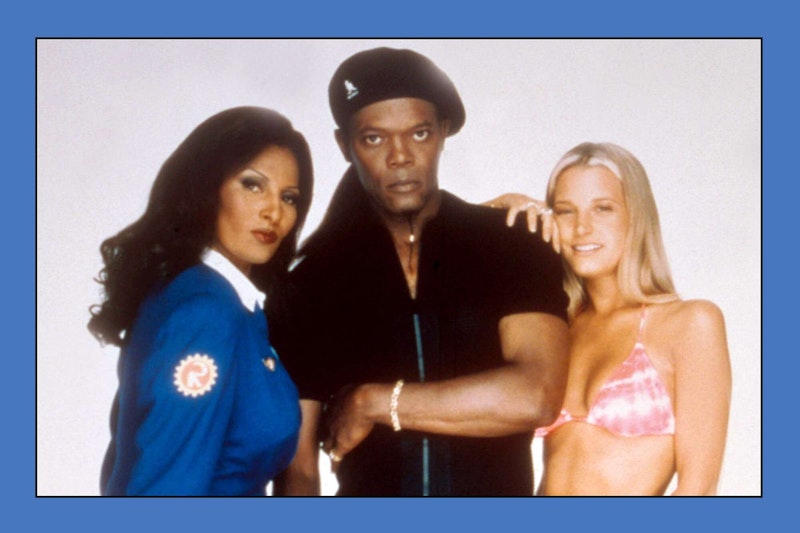Quentin Tarantino’s 1997 love story Jackie Brown is a novelistic slow-burn, starring Pam Grier in the lead, Samuel L Jackson as a very bad man, and Robert Forster as Max Cherry, the smitten bail bondsmen. Think Éric Rohmer meets Arthur Penn meets Sam Fuller meets Elmore Leonard and you’re getting there. There’s so much depth to this loquacious character study that I sometimes think I know these people better than I know myself. Max makes an important decision, and I think Max would do that. Whereas I make a decision and think, why did I just do that?
Jackie’s by all appearances an unstoppable 44-year-old stewardess, but don’t let her foxy uniform fool you, ever since she got in trouble carrying drugs for a cokehead pilot ex-husband, it’s been hard, flying for third-class Cabo Air. The good news, sort of, is that she’s mixed up with a ponytail-wearing gunrunner who dresses like a souped-up Spanish bullfighter, Ordell Robbie (Jackson), smuggling in his money from Mexico. It’s a side hustle until one of his goons (a fellow by the name of Beaumont) gets caught “drunk-driving with a goddamn pistol.” Ordell bails him out, so he can blow his brains out before Beaumont says anything stupid (oops too late): Beaumont’s already given Jackie up to the cops. This is par for the course for members of Ordell’s payroll.
Even though their stupidity is lethal, they carry on, doing dumbass stoner shit and talking behind his back. Bridget Fonda, Ordell’s surfer girl, says he may be streetwise, but he’s still a fuck-up. “Did you know he moves his lips when he reads?” This talk is crazy because Ordell’s one menacing, murderous motherfucker! Meanwhile, the De Niro character is loyal like a Dalmatian, but he doesn’t function at all, seems completely in over his head, and worse, has no idea who Demi Moore is. Chris Tucker as Beaumont fits the dumbass bill but he doesn’t last very long; his demise is memorable, with a set-piece so elegant and grandiose, you can hear Orson Welles’ ghost chortling with reverence.
In the middle of this hapless mess is Jackie, the only one in Ordell’s stable with any stability or cred. But even she’s a mess carrying $50,000 from Mexico along with some blow that she didn’t know about when stopped by two agents (Michael Bowen and Keaton, who’s observed drinking coffee and chewing gum at the same time). With Jackie in custody, Ordell freaks out and fears she’ll squeal, so he pays her bond to eliminate her just like Beaumont. Except Jackie’s been marinating over this, and by the time she gets out, she’s a step ahead.
Max Cherry picks her up from jail. Max understands what’s at stake and the kind of danger this woman is in, but nevertheless he gets a natural high when she walks out (Bloodstone’s “Natural High” is playing). As Bacharach wrote, this guy’s in love. It’s hard to know what Jackie was hearing. Who do you hear when you fear your executioner is calling? (For me, it’s always that Paul Simon song “You Can Call Me Al.”) Instead, and this is the best part, Jackie and Max have a destiny, and it’s the beginning of a beautiful relationship, ready with a wild plan to walk away with Ordell’s money. As Max notes at one point, "I’d be tempted getting out of this bail bond business.”
It’s a blast watching Jackie bob and weave between the good and the bad, seedy parts of LA, its haunts, the opulent dives; even LAX looks cool, with Jackie commuting spectacularly through it to Bobby Womack’s vibe-heavy “Across 110th Street.”
What makes this movie so resonant in such a classical way is the flame Jackie ignites in Max Cherry that encompasses this idea of love, risking everything, and the scoring of unexpected triumphs. Who knows—Max might even discover a band he missed the first time around. Pops The Delfonics’ cassette into the Cadillac tape deck. Music follows. “(Didn’t I) Blow Your Mind This Time?”

